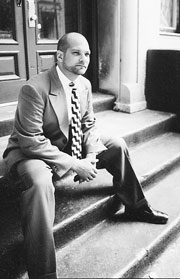By Erica Stein
David Wallis thinks that objectivity in journalism is overrated.
“Media magazines have taken this he said / she said balance to an extreme,” said Wallis, editor of Featurewell.com, in a recent interview near his Greenwich Village home. “Not every article has to be balanced. I prefer brilliant, more informed opinion that’s not afraid to call something wrong. Then maybe the next week you run something from the other side.”
Having applied his theories as a freelance journalist and founder of a successful dot.com, Wallis now implements them as the creator and editor of a new book, “Killed: Great Journalism Too Hot To Print” (Nation Books, $16.95).
Wallis, 37, has written for The New York Times Magazine and The Washington Post. An outspoken advocate for the rights of freelance writers and constant decrier of their abuse, Wallis has since 2000 run Featurewell.com, an online company that supplies articles to registered editors. Since its creation, Featurewell has sold over $200,000 in articles from over 1,000 writers to 900 editors.
“I think it was easy for me to make the transition to editor, because I’ve edited 40 articles a week since 2000,” Wallis said. “Featurewell has a new roster of articles each week. Mostly political, but art and sports, too.”
The site’s contributors are a select group that includes Christopher Hitchens, Andrei Codrescu and Susan Cheever. In interviews with The San Francisco Chronicle and Online Journalism Review, Wallis has attributed the site’s success to its dependence on quality rather than quantity. Wallis followed the same policy with “Killed,” which he describes in the introduction as a “literary orphanage” for articles that were commissioned and then disposed of because, in Wallis’s words, they “disturbed the commissioning editor or the magazine’s lawyer or the publisher or perhaps the publisher’s pals. This book grant[s] readers a look at the sometimes sordid process that determines what you read and what you can’t.”
He initially considered 200 pieces for inclusion, eventually selecting 24. “I looked for things that made me think or made me laugh. I looked for quality. There were stories that deserved to be killed, but I didn’t include them in the book.” His five favorite stories from the collection — Jon Entine’s investigation of the Body Shop, Neil Steinberg’s parody of trade conventions, Erik Hedegaard on rock stars and cigarettes, Larry Doyle’s biting depiction of publicists and Mike Sager’s subtly wrenching piece on Palestinian refugee camps — represent a cross section of every kind of good story that never sees the light of day.
Wallis presents mostly contemporary pieces, but begins with four older articles by authors including George Orwell and Betty Friedan that place the book in a historical context. Among of these is Terry Southern’s profile of Stanley Kubrick and preview of “Dr. Strangelove.” This feature — included, according to Wallis, “as a favor to film fans, besides, how often do you get to read an unpublished piece by Southern?” — was rejected by Esquire, because it didn’t convey Kubrick’s thoughts on Sue Lyon and Liz Taylor. “It wasn’t a puff piece, so they dropped it,” marveled Wallis, who noted that the piece instead gave a brilliant insider’s view of a set and a director along with Southern’s thoughts about the nuclear policy of “pre-emption.” “That’s pretty amazing stuff for 1963,” Wallis said.
According to Wallis, the heart of the book is Hitchens’s introduction to an Orwell book review — of a book that detailed the excesses of British aristocrats in Singapore and Burma — which Wallis characterizes as more subversive than Orwell’s review itself. “Listen to this,” said Wallis, “ ‘None of Orwell’s would-be censors ever alleged that what he was saying was not true. They asserted that the time was not right for such things to be said … [the editor’s] note is a demonstration case of the fatuity of the censorial mind.’ That sums up the book.”
Wallis argues, in this book and on his Web site, that the need for the facts, for the story, is what’s missing from journalism today. Too often editors overstep by “stifling” the story in rewrites or by not printing it at all, he said. Wallis blames the situation partly on editors being shareholders in the newspaper, “more concerned with the bottom line” than the “public service” aspect of journalism. It’s also due, said Wallis, to the increasing ability of the advertising department to dictate content, and the incestuous nature of the industry — everyone is afraid to offend someone they may need later on. Self-censorship and timidity before power are “much of a muchness,” said Wallis, making it difficult for pieces capable of provoking “serious controversy” to compete in a market geared toward “celebrity gossip.”
Not that there isn’t hope: “If you present readers with a powerful, well-reasoned, edgy, sometimes risky product, you can excite, anger or move them,” said Wallis. “And circulation will rise.” While Wallis admitted he doesn’t “have any solutions,” he hopes the book will “educate readers to think about what we’re being fed.” A forum to discuss “Killed” is live at www.killedstories.com, where Wallis will accept and run letters to the editor about the book.
Read More: https://www.amny.com/sports/baseball/mets/




























